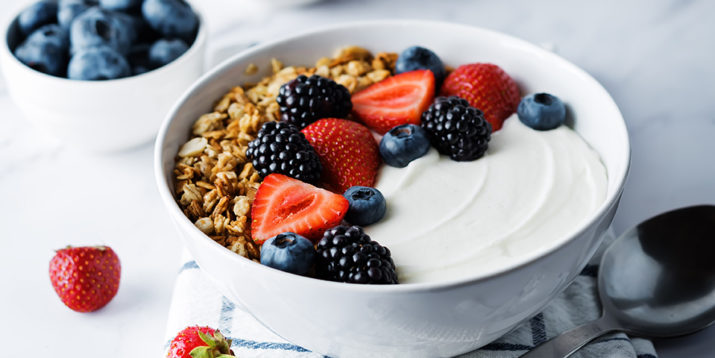
Is Frozen Yogurt Healthy for Weight Loss?
In this captivating blog post, we embark on a flavors explore the nutritional wonders of frozen yogurt, its role in the quest for weight loss, the tantalizing influence of toppings on its healthiness, and much more.
Nutritional Composition of Frozen Yogurt
Is Frozen Yogurt Healthy for Weight Loss? let's first unravel the secrets hidden within its nutritional composition. Frozen yogurt typically boasts a harmonious blend of milk, sugar, and live cultures—those benevolent bacteria that grace it with a tangy twist. Some frozen yogurt variations may even incorporate the sweet essence of fruit, the crunch of nuts, or other delightful flavorings.

According to the United States Department of Agriculture (USDA), a half-cup serving of vanilla frozen yogurt dances on the tongue with approximately:
- 100 calories
- 2 grams of protein
- 17 grams of carbohydrates
- 3 grams of fat
- 1 gram of fiber
- 16 grams of sugar
In comparison to its rich cousin, traditional ice cream, frozen yogurt generally flaunts a slimmer figure in terms of fat and calorie content. Yet, a word of caution is in order—some frozen yogurt varieties may tiptoe towards a higher sugar content than their ice cream counterparts, potentially posing a challenge on the path to weight loss.
Calories in Frozen Yogurt Compared to Other Desserts
When the quest for weight loss is on the horizon, calorie count reigns supreme. The simple equation dictates that to shed pounds, you must consume fewer calories than you burn. So, how does the noble frozen yogurt fare in the realm of calories, when compared to other illustrious dessert contenders?
Let's turn to the calorie tally for a half-cup serving of several dessert classics, as documented by the USDA:
- Vanilla ice cream: 137 calories
- Chocolate cake with frosting: 237 calories
- Chocolate chip cookie: 143 calories
- Apple pie: 143 calories
- Brownie: 132 calories
As the numbers reveal, frozen yogurt usually emerges with a lighter calorie load than many of its dessert companions. However, let's not forget that the size of your portion and the choice of toppings can dramatically sway the calorie content of your frozen yogurt masterpiece.

Role of Frozen Yogurt in a Weight Loss Diet
So, the question lingers: Is frozen yogurt a trustworthy ally in your weight loss journey? The answer, my friends, is as diverse as the flavors of frozen yogurt themselves, and it hinges on various factors including your overall diet, activity level, and the scale of your weight loss aspirations.
If your goal is to shed those extra pounds, the most pivotal action you can take is to create a calorie deficit by consuming fewer calories than you burn. In this regard, frozen yogurt can indeed be a valuable addition to your weight loss repertoire, given its typically lower calorie count in comparison to other dessert options.
However, it's essential to recognize that leaning too heavily on frozen yogurt or any singular food as a panacea for weight loss is not a sustainable or healthful approach. Instead, aim to invite a diverse array of nutrient-rich foods into your daily diet—think fruits, vegetables, whole grains, lean proteins, and healthy fats, all playing their part in the symphony of wellness.
Readmore: Where to buy frozen yogurt?
Effect of Toppings on the Healthiness of Frozen Yogurt
While frozen yogurt may shine as a lower-calorie dessert choice compared to ice cream and its dessert comrades, the toppings you choose can dramatically sway its healthfulness. Many beloved frozen yogurt toppings, like candy, chocolate chips, and syrups, march to a sugary and calorie-laden beat.
To keep your frozen yogurt treat on the virtuous path, consider adorning it with fresh fruits, nuts, and seeds as toppings. These choices bestow flavor and texture without substantially inflating the calorie or sugar count.
Frozen Yogurt vs. Ice Cream for Weight Loss
As we've already uncovered, frozen yogurt tends to tip the scales in favor of lower calories and reduced fat when compared to traditional ice cream. However, this doesn't necessarily translate to it being the superior choice for weight loss.
In fact, some experts make the case that ice cream might hold the upper hand as a dessert option for weight loss. Why, you ask? It all boils down to fat and protein content. These two pillars of satiety can keep hunger at bay for longer periods, potentially making it easier to adhere to your calorie goals and resist the temptation to overindulge.
Nonetheless, if you yearn for a sweet treat while staying committed to your weight loss objectives, frozen yogurt likely emerges as the preferred candidate. But remember, dear reader, the watchwords are moderation and mindfulness—keep a close eye on portion sizes and toppings!
The Importance of Portion Control When Consuming Frozen Yogurt for Weight Loss
One of the most formidable challenges on the path to weight-conscious frozen yogurt consumption is mastering the art of portion control. It's all too tempting to heap on those toppings or upgrade to a larger serving, but beware, for this is where a seemingly harmless treat can swiftly transform into a calorie-laden bombshell.
To maintain a firm grip on your frozen yogurt consumption, try measuring out a half-cup serving and resist the allure of oversized cups or cones. Alternatively, opt for pre-portioned containers or single-serving cups, which serve as reliable guides on your calorie-counting journey.
Low-Fat vs. Regular Frozen Yogurt for Weight Loss
As you tread the path of choosing the perfect frozen yogurt for your weight loss journey, another twist in the tale emerges: low-fat vs. regular varieties. Low-fat frozen yogurt often beckons as the virtuous choice, with its promise of reduced fat and calories compared to its full-bodied counterpart.
Yet, here's the delicious twist - some experts argue that the very act of stripping fat from dairy products might not necessarily crown them as healthier options. You see, when fat departs, sugar or artificial ingredients often swoop in to maintain flavor and texture, throwing the balance into question.
The outcome? Some low-fat frozen yogurt offerings may inadvertently parade a higher sugar and additives count than their full-fat cousins. Intriguingly, research has shown that modest doses of wholesome fats, such as those cradled in whole milk products, could actually be a boon for your weight loss endeavors.
When frozen yogurt beckons, take a moment to embark on a label-reading expedition. Carefully scrutinize and compare the sugar and calorie content of your options. Ultimately, the perfect choice will dance to the rhythm of your personal preferences and dietary needs.

Sugar Content in Frozen Yogurt and Its Impact on Weight Loss
Sugar, the sweet seducer of dessert lovers, takes center stage when it comes to choosing treats for weight loss. Excessive sugar intake can pave the road to weight gain, insulin resistance, and a parade of other unwelcome health issues.
Sadly, the sugar story is no different in the world of frozen yogurt. Many frozen yogurt varieties generously embrace sugar, luring us into their sugary embrace. While some brands extend the olive branch with sugar-free or reduced-sugar options, these may come dressed in the garb of artificial sweeteners or other ingredients that send health alarm bells ringing.
To preserve the sanctity of your frozen yogurt indulgence, make it a mission to pick products that tread lightly on the sugar path. Moreover, keep an eagle eye on the toppings you adorn your frozen yogurt with, as they can dramatically elevate its sugar content.
Readmore: How many calories frozen yogurt?
Are Frozen Yogurt Alternatives Healthier for Weight Loss?
In the realm of frozen yogurt, alternatives have stepped into the spotlight, offering promises of dairy-free delight and fewer calories. These contenders, including coconut milk yogurt, almond milk yogurt, and soy yogurt, have captured the hearts of those with dairy allergies or preferences.
However, before you let your taste buds be swayed, it's worth pondering whether these alternatives are indeed champions of weight loss. Like many non-dairy options, they may harbor higher sugar levels and lower protein counts than their dairy-based counterparts.
If the allure of a non-dairy frozen yogurt alternative beckons, embark on a label-reading expedition. Carefully compare its calorie and sugar content to the traditional frozen yogurt you know and love.
Expert Opinions on Incorporating Frozen Yogurt into a Weight Loss Plan
So, what pearls of wisdom do the experts offer on incorporating frozen yogurt into your weight loss voyage? According to the sage advice of registered dietitian Keri Glassman, frozen yogurt can indeed be a beacon of hope in the world of desserts. But, and it's a resounding but, it must be savored in moderation, alongside nutrient-rich companions like fruits and nuts.
Yet, she cautions against placing all your weight loss hopes on the shoulders of frozen yogurt or any single food for that matter. Instead, the path to success lies in crafting a balanced diet that celebrates a variety of whole foods.
Another esteemed registered dietitian, Tamara Duker Freuman, echoes the sentiment. She proposes selecting frozen yogurt boasting a commendable 10 grams of protein per serving, the key to keeping cravings at bay. Further, she advises steering clear of toppings that flaunt high levels of added sugars or unhealthy fats.
In sum, the secret to welcoming frozen yogurt into your weight loss plan lies in the gentle embrace of moderation and equilibrium. Seek out low-sugar, nutrient-rich variants, maintain vigilance over portions and toppings, and let this luscious treat elevate your journey to success.
Conclusion
In conclusion, Tutti Frutti Frozen Yogurt, with its swirls of delight, can indeed be a harmonious choice for those on the path to weight loss. Yet, the key lies in careful selection and judicious consumption. Seek out varieties that tip the scales towards low added sugars and high protein. Keep a watchful eye on portions and toppings, as these elements possess the power to sway the calorie and sugar scales. Ultimately, make it a point to invite a symphony of nutrient-rich foods into your daily diet, a chorus that sings in harmony with your weight loss aspirations.
